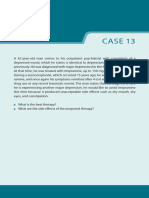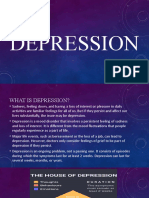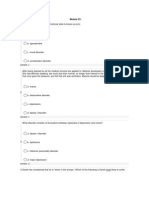Anxiety & Depression
Anxiety & Depression
Uploaded by
Omar DiazCopyright:
Available Formats
Anxiety & Depression
Anxiety & Depression
Uploaded by
Omar DiazCopyright
Available Formats
Share this document
Did you find this document useful?
Is this content inappropriate?
Copyright:
Available Formats
Anxiety & Depression
Anxiety & Depression
Uploaded by
Omar DiazCopyright:
Available Formats
Anxiety and depression
Discussion
Read this information and discuss the questions below with a partner:
A recent medical survey in Britain revealed that 25% of the
population saw n o hope for the future and one in ten felt that life
was not worth living. Many teenagers were excessively worried
about their weight and general appearance. Approximately 25%
claimed they suffer from anxiety over their studies.
1. Are you surprised by these statistics?
2. Are you basically happy with your life?
3. When i s the happiest you have ever been?
4. What i s happiness?
Reading
Read through the article and answer this question -What exactly is this man's problem?
When I was married I thought I was 'stupid' and 'incompetent'. I shut my
miserable because of my wife. So, we got friends out and I became generally useless.
divorced, and then I thought things would Sometimes I would go out to do a bit of
change. But I was still depressed somehow. shopping and I would see happy couples
Friends used to invite me out, and though I walking around - some of them with
had nothing else going on, I'd tell them that children - and then I would feel even
I was busy or that I had other plans, but I'd worse. And so I thought, "That's it! I'm
just stay at home and watch TV or vegetate. lonely. I need a girlfriend." And so I got on
So, then I blamed it on my job. I used to the internet to try and meet people. And I
fantasise about just leaving the place. I did. And for a few weeks I actually thought
started taking days off sick. M y performance I was getting better. But it got worse.
went downhill. But I couldn't quit. I was I started thinking about old age and death.
scared. I would wake up in the middle of And pretty soon the things that used to
the night, just lying there -thinking. make me happy, things like nice weather
Then a job opportunity came up at a and a call from a friend, started to seem
different company, and for a few months more like irritations. Life began feeling
I actually thought I was getting better. But pretty pointless. I think I was on the verge
then it came back- with a vengeance. of giving up on it all when I met Judy.
I started crying - literally crying - for no The advice Judy gave me changed my life
reason at all, sometimes in the middle of for the better, and probably forever. I can't
the day. I started calling myself names like believe the difference it has made.
Read the article again and discuss these questions with a partner:
1. What seemed t o be the man's problem?
2. What aspects of the man's life did this problem affect?
3. Have you or anyone you know ever felt like him?
4. Who i s Judy and what do you think she said to him?
5 . What advice would you have given him?
31 Anxiety and depression Taboos and Issues
r
Language Discussion
Complete the sentences below with these words: Some mental conditions are controversial, with
usual take low down some experts saying the problem is all in the
mind. Are the following conditions real?
under hard top weather
Chronic Fatigue Syndrome
1.Things are just getting me . . . . . . .
permanent tiredness caused b y stress
2. He's not his . . . . . . self at all.
3. I'm feeling a bit under the . . . . . . . Seasonal Affective Disorder
4. I'm feeling a bit . . . . . . at the moment. depression caused b y long, dark winters
5. Things are getting on . . . . . . of me. Post-traumatic stress disorder
6. I'm finding life . . . . . . at the moment. persistent emotional problems after being
7. I'm . . . . . . a lot of pressure. involved in a traumatic incident
8. I'm not sure I can . . . . . . much more. Road rage
Which sentence above is usually used to talk getting angry and possibly violent because of
about physical rather than emotional or the stress of modern driving conditions
psychological health? Mid-life crisis
Do any of these sentences apply to you or anyone a sudden crisis of confidence suffered by men
you know at the moment? around the age o f 45
Reading
Read these ten tips on how to be happy. Which do you think are genuinely helpful?
HAPPY HABITS
Ten proven ways to increase your happiness
Most people are unhappy because they choose to be. All they have to do is change their
minds and learn some new habits and their lives will change for ever. Here are ten habits
of happy people. Try them and experience the results for yourself.
-
Act happy even if you don't feel it. A smiling face will get more smiles from others.
Enjoy the moment. Happiness is not produced by great things happening, but by
recognising all the little positive things that happen every day.
Take control of your time. Happy people feel in control of their lives. Set yourself
realistic goals for the day.
Take regular exercise. Get your body producing those depression-busting chemicals.
Get rest. We all need time on our own and enough sleep - make time to re-charge
your batteries.
Sing. People who sing are happier. It's the people who have to listen to them who are
unhappy. Be a singer.
Get a pet. Stroking a cat or patting a dog has therapeutic effects, calming anxiety.
Feed your soul. Studies show that actively religious people are happier. They cope
better with crises and are part of a supportive, accepting community.
Prioritise close relationships. Spending time in open communication with loved ones
stops isolation and independence.
Get out of town. Spend a few hours a week in the countryside. Smell the fresh air,
touch the flowers and hug a tree.
Discussion
Discuss with a partner or as a class:
1. Is this serious advice or just light-hearted?
2. Do you agree that to be happy you just need to 'change your mind'?
3. Could the tips above help someone who is seriously depressed? Are any unhelpful?
4. Have you ever had to help a friend who was depressed?
Taboos and Issues Anxiety and depression 31
m
You might also like
- Cognitive Behavioral Therapy by Olivia Telford PDFDocument114 pagesCognitive Behavioral Therapy by Olivia Telford PDFnonimugo100% (4)
- Bulletproof Confidence Checklist (James W. Williams) (Z-Library)Document33 pagesBulletproof Confidence Checklist (James W. Williams) (Z-Library)Garvey Milton100% (1)
- 7 Thoughts to Live Your Life By: A Guide to the Happy, Peaceful, & Meaningful Life: Master Your Mind, Revolutionize Your Life, #10From Everand7 Thoughts to Live Your Life By: A Guide to the Happy, Peaceful, & Meaningful Life: Master Your Mind, Revolutionize Your Life, #10Rating: 5 out of 5 stars5/5 (1)
- How to Control your Emotions: Effective Ways to Maintain Your Cool When The Situation Demands ItFrom EverandHow to Control your Emotions: Effective Ways to Maintain Your Cool When The Situation Demands ItNo ratings yet
- Copyofiqwinterviewquestionworksheet CindyocotitlaDocument13 pagesCopyofiqwinterviewquestionworksheet Cindyocotitlaapi-271256579No ratings yet
- Overcoming Depression For Teenagers & Young Adults: By Tilly McIntyre - A Young Girl Who Has Been There & Worn The T-shirtFrom EverandOvercoming Depression For Teenagers & Young Adults: By Tilly McIntyre - A Young Girl Who Has Been There & Worn The T-shirtNo ratings yet
- Depression and Low Mood: An NHS Self Help GuideDocument29 pagesDepression and Low Mood: An NHS Self Help GuideKristine Apostol RecanaNo ratings yet
- Depression and Low MoodDocument40 pagesDepression and Low Moodfau fau100% (1)
- How To Stop Your Depression NowDocument170 pagesHow To Stop Your Depression NowGoodluckleo De GreatNo ratings yet
- Beating The BluesDocument4 pagesBeating The BlueshotaussieguyNo ratings yet
- How To Get Over Depression?Document6 pagesHow To Get Over Depression?Bijay SinghNo ratings yet
- Suicide Is Not A Solution - Do Not Try To Predict Your FutureDocument8 pagesSuicide Is Not A Solution - Do Not Try To Predict Your FutureAngelica MorcozoNo ratings yet
- Mastering Your Thoughts: Mind-Hacks No One’s Talking About, Detachment Secrets and How to Kick Inner Emotions Into High GearFrom EverandMastering Your Thoughts: Mind-Hacks No One’s Talking About, Detachment Secrets and How to Kick Inner Emotions Into High GearNo ratings yet
- Discover The Secrets To Destroy DepressionDocument20 pagesDiscover The Secrets To Destroy DepressionShreeya KharbandaNo ratings yet
- The Depression Book: Depression as an Opportunity for Spiritual GrowthFrom EverandThe Depression Book: Depression as an Opportunity for Spiritual GrowthNo ratings yet
- Freedom: Escape Negativity & Overthinking to Live Happily & Find Your PurposeFrom EverandFreedom: Escape Negativity & Overthinking to Live Happily & Find Your PurposeNo ratings yet
- Nuggets of Wisdom Vol 1. Issue 2. Jan/Feb 2012Document4 pagesNuggets of Wisdom Vol 1. Issue 2. Jan/Feb 2012InnerWisdomNo ratings yet
- Self-Help On The Go: Because You Are Not Broken, But Life Gets Tricky SometimesFrom EverandSelf-Help On The Go: Because You Are Not Broken, But Life Gets Tricky SometimesNo ratings yet
- Get Rid Of Anxiety & Panic Attacks: Guide for Teenagers & Young AdultsFrom EverandGet Rid Of Anxiety & Panic Attacks: Guide for Teenagers & Young AdultsRating: 4 out of 5 stars4/5 (1)
- Cognitive Behavioral Therapy Olivia TelfordDocument114 pagesCognitive Behavioral Therapy Olivia TelfordmikesoupNo ratings yet
- Depression Mike KingDocument4 pagesDepression Mike KingCarlNo ratings yet
- Therapy GoalsDocument3 pagesTherapy GoalsPranavNo ratings yet
- Prisoner Depression and Low MoodDocument32 pagesPrisoner Depression and Low MoodbudhinoNo ratings yet
- Declutter Your Mind: How to Stop Overthinking, Beat Your Inner Critic, and Reframe Your Negative Thoughts with Healthy HabitsFrom EverandDeclutter Your Mind: How to Stop Overthinking, Beat Your Inner Critic, and Reframe Your Negative Thoughts with Healthy HabitsRating: 5 out of 5 stars5/5 (1)
- Anxiety Depression StressDocument21 pagesAnxiety Depression StressivyoalNo ratings yet
- Natalie Austin Coping Skills BookletDocument11 pagesNatalie Austin Coping Skills Bookletapi-313609383No ratings yet
- 31 Days of Depression: Inside the Depressed MindFrom Everand31 Days of Depression: Inside the Depressed MindRating: 5 out of 5 stars5/5 (1)
- Depression and Anxiety Ebook Believe and Live AgainDocument11 pagesDepression and Anxiety Ebook Believe and Live AgainZina ArinzeNo ratings yet
- Self-Help Toolkit For Anxiety And Stress: A series of simple steps to improve your day and build resiliance against anxiety and stress.From EverandSelf-Help Toolkit For Anxiety And Stress: A series of simple steps to improve your day and build resiliance against anxiety and stress.No ratings yet
- Everyday Mindfulness: Change Your Life by Living in the Present (Mindfulness for Beginners)From EverandEveryday Mindfulness: Change Your Life by Living in the Present (Mindfulness for Beginners)No ratings yet
- Befriend Your Brain: A Young Person's Guide to Dealing with Anxiety, Depression, Anger, Freak-Outs, and TriggersFrom EverandBefriend Your Brain: A Young Person's Guide to Dealing with Anxiety, Depression, Anger, Freak-Outs, and TriggersRating: 5 out of 5 stars5/5 (2)
- Stop Overthinking: Mindfulness Can Be Yours - Choose To Live Mindfully Every Single DayFrom EverandStop Overthinking: Mindfulness Can Be Yours - Choose To Live Mindfully Every Single DayNo ratings yet
- How To Stop Worrying and Start Living: Book Summary & PDFDocument5 pagesHow To Stop Worrying and Start Living: Book Summary & PDFMaria CristinaNo ratings yet
- Adult MH Aware Workbook InteractiveDocument20 pagesAdult MH Aware Workbook InteractiveColin GirdwoodNo ratings yet
- Embracing ADHD: A Transformational JourneyFrom EverandEmbracing ADHD: A Transformational JourneyRating: 1 out of 5 stars1/5 (1)
- 7-Habits-of-Calm-Happy-People-May-2020-findcalm.com_Document70 pages7-Habits-of-Calm-Happy-People-May-2020-findcalm.com_TwogunkidNo ratings yet
- Stop Anxiety from Stopping You: The Breakthrough Program For Conquering Panic and Social AnxietyFrom EverandStop Anxiety from Stopping You: The Breakthrough Program For Conquering Panic and Social AnxietyNo ratings yet
- Do you mind - Habits for anxiety and fearDocument32 pagesDo you mind - Habits for anxiety and fearArmando LegerNo ratings yet
- Are You Feeling SuicidalDocument11 pagesAre You Feeling SuicidalGraciela PaolaNo ratings yet
- Overthinking: How to Declutter and Unfu*k Your Mind, Build Mental Toughness, Discover Fast Success Habits, Thinking & Meditation, Mindfulness for Creativity, Slow Down the Brain and Be YourselfFrom EverandOverthinking: How to Declutter and Unfu*k Your Mind, Build Mental Toughness, Discover Fast Success Habits, Thinking & Meditation, Mindfulness for Creativity, Slow Down the Brain and Be YourselfNo ratings yet
- Activity 10 - Stress Warning Signals WorksheetDocument2 pagesActivity 10 - Stress Warning Signals WorksheetSirDatz TheGreatNo ratings yet
- Depression Anxiety Stress ScaleDocument2 pagesDepression Anxiety Stress ScaleYanna LozanoNo ratings yet
- Depression WorksheetsDocument62 pagesDepression WorksheetsjackNo ratings yet
- Bssa Worksheet Outpatient Youth Asq Nimh ToolkitDocument4 pagesBssa Worksheet Outpatient Youth Asq Nimh ToolkitJose Roberto Pereira de SousaNo ratings yet
- Case 13Document8 pagesCase 13مشتاقة للجنةNo ratings yet
- 04 Guidelines For Switching From Quetiapine Modified Release To Quetiapine ..Document4 pages04 Guidelines For Switching From Quetiapine Modified Release To Quetiapine ..Chris SejNo ratings yet
- The Reasons of DepressionDocument2 pagesThe Reasons of DepressionĐỗ Thị Ngân HàNo ratings yet
- BiiiDocument2 pagesBiiiRogin Alrea Mae PalermoNo ratings yet
- DEPRESSION (Anaya Singh)Document16 pagesDEPRESSION (Anaya Singh)Arasshjit SandhuNo ratings yet
- LRPD1 Ingles IiDocument4 pagesLRPD1 Ingles IiEsther guisela TarquiNo ratings yet
- Abnormal Psychology 15th Edition Butcher Test Bank Full Chapter PDFDocument62 pagesAbnormal Psychology 15th Edition Butcher Test Bank Full Chapter PDFDouglasRubiopger100% (16)
- Cluster Word Web 2Document1 pageCluster Word Web 2api-430754451100% (1)
- Graded Assignment: Great Depression in AmericaDocument3 pagesGraded Assignment: Great Depression in Americapmadi51022No ratings yet
- Crises in Adulthood PresentationDocument17 pagesCrises in Adulthood Presentationombasaduncanmoffat004No ratings yet
- Journal of Affective Disorders: A B C B D A B C B D e B D eDocument3 pagesJournal of Affective Disorders: A B C B D A B C B D e B D elonscyberNo ratings yet
- Table 7-2 - Screening Questions For Common Mental DisordersDocument1 pageTable 7-2 - Screening Questions For Common Mental DisordersDragutin PetrićNo ratings yet
- Types of DepressionDocument3 pagesTypes of DepressionMae DayNo ratings yet
- 100 Great English OxymoronsDocument1 page100 Great English OxymoronsIrlan LeiteNo ratings yet
- Nur Rakhmanto HeryanaDocument8 pagesNur Rakhmanto Heryana2117 Sentia SitungkirNo ratings yet
- mOTIVATIONAL SPEECH ABOUT SUICIDEDocument1 pagemOTIVATIONAL SPEECH ABOUT SUICIDEFGHXRHXNo ratings yet
- Hidden Treasures Music Store GENERAL READING TESTDocument6 pagesHidden Treasures Music Store GENERAL READING TESTa1english academyNo ratings yet
- Farm and Rural Stress Leaflet FinalDocument2 pagesFarm and Rural Stress Leaflet Finalapi-526565876No ratings yet
- Copy of Копия - Newspaper -Document4 pagesCopy of Копия - Newspaper -MICHAELA MONGUISNo ratings yet
- Chapter 6 PDF Coping Up With Stress in Middle and Late AdolescenceDocument23 pagesChapter 6 PDF Coping Up With Stress in Middle and Late AdolescenceJen E. BallatNo ratings yet
- Edinburgh Postnatal Depression Scale Scoring SheetDocument3 pagesEdinburgh Postnatal Depression Scale Scoring Sheetcodrutal_2No ratings yet
- Methodology of Echo State Neural Network To Diagnose Human DepressionDocument4 pagesMethodology of Echo State Neural Network To Diagnose Human Depressionpurushothaman sinivasanNo ratings yet
- PHQ 9t and Gad 7 With Scoring GuidelinesDocument2 pagesPHQ 9t and Gad 7 With Scoring Guidelinesmaria.acevedo3No ratings yet
- 21 22CSAT Test5 KEYDocument37 pages21 22CSAT Test5 KEYAJNo ratings yet
- Module 23 QuizDocument7 pagesModule 23 QuizPaige Shilling100% (1)
- Mood Disorders - AhujaDocument12 pagesMood Disorders - AhujaDivijaa MoreNo ratings yet

























































































